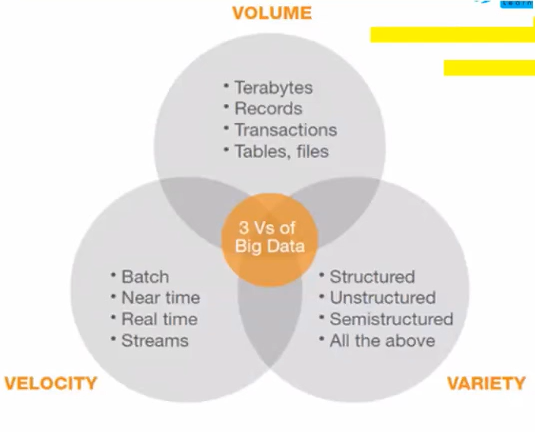Introduction
In today's data-driven world, the term "big data" is often thrown around as a buzzword, but the reality is that many companies struggle to effectively harness its potential. Despite the increasing importance of data in decision-making processes, a significant number of organizations find themselves unable to leverage big data effectively. This talk aims to explore the challenges and misconceptions surrounding big data in companies.
What is Big Data?
When I learned in university, big data is a field that treats ways to analyze, systematically extract information from, or otherwise deal with data sets that are too large or complex to be dealt with by traditional data-processing application software. It is characterized by the three Vs: Volume, Velocity, and Variety.
Ok, let's see weather your company have big data or not:
- Volume: Do you have a large amount of data? (e.g., terabytes or petabytes)
- Velocity: Is your data generated and processed at high speed? (e.g., real-time)
- Variety: Do you have diverse types of data? (e.g., structured, unstructured, semi-structured)

What's the problem?
Many companies face several challenges when it comes to big data:
- Data Silos: Data is often stored in different systems and formats, making it difficult to integrate and analyze.
- Lack of Expertise: There is a shortage of skilled professionals who can effectively manage and analyze big data.
- Infrastructure Issues: Many organizations lack the necessary infrastructure to store and process large datasets
- Data Quality: Poor data quality can lead to inaccurate insights and decisions.
- Cost: Implementing big data solutions can be expensive, and many companies struggle to justify the investment.
- Cultural Resistance: Employees may be resistant to change and hesitant to adopt new data-driven approaches.
Misconceptions about Big Data
There are several misconceptions about big data that can hinder its effective use:
- Big Data is Only for Large Companies: While large companies may have more data, small and medium-sized businesses can also benefit from big data analytics.
- More Data is Always Better: Quality is more important than quantity. Having too much data can lead to analysis paralysis.
- Big Data is a One-Time Project: Big data initiatives require ongoing effort and investment.
- Big Data is Only for Tech Companies: All industries can benefit from big data
- Big Data is Only About Technology: Successful big data initiatives require a combination of technology, people, and processes.
- Big Data Guarantees Success: While big data can provide valuable insights, it does not guarantee business success. It must be used effectively to drive decision-making.
- Big Data is Only for Data Scientists: While data scientists play a crucial role, big data initiatives require collaboration across various departments, including business analysts, IT, and management.
What the hell with BIM data?
Almost all challenges in BIM are related to data that is not consistent, not clean, not enough, not in the right format, not in the right place, and not at the right time. So if you want to use BIM data, you need to spend a lot of time cleaning and preparing the data before you can use it.
But who will do that? The answer is you need a data engineer. No, you need to be a BIM engineer who can also do data engineering. Because if you don't understand the data, you will not be able to clean and prepare it properly, you also need to update data for the model regularly to improve the data quality and source in the model.
Overcome the challenges and misconceptions surrounding big data in companies, organizations need to focus on the following strategies:
- Data Governance: Implementing strong data governance practices to ensure data quality, security, and compliance.
- Skill Development: Investing in training and development to build a skilled workforce.
- Infrastructure Investment: Building the necessary infrastructure to store and process large datasets.
- Cultural Change: Fostering a data-driven culture that encourages collaboration and innovation.
Conclusion
I hope this post to help you to understand more about big data, and if your company don't have big data, don't worry, you can start small and gradually build your big data capabilities. Focus on solving specific business problems and demonstrating the value of data-driven decision-making. Remember, the journey to becoming a data-driven organization is a marathon, not a sprint.